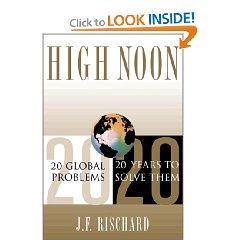Comment: This book should be updated and reprinted in time for November 2008.
Chuck Spinney, who made the cover of TIME in the 1980's as a whistle-blower on defense waste and mismanagement, has in this book presented a readable, well-documented and well-illustrated account of how virtually every single weapons and mobility system now in the Pentagon system is over-priced, over-weight, over-budget, and not able to perform as advertised. Although out-of-print, there are hundreds of copies of this book that can be obtained via Amazon's used book channels, and the author is writing a sequel that will be easier to understand if this book is digested first.
In addressing the plans reality mismatch, the author is very effectively demonstrating that doctrine, technology and the budget are completely divorced from both real world threats, and real world logistics.
With superb assistance from the editor, James Clay Thompson, who has converted the author's Pentagon-speak to plain English, the author documents the insanity and the irresponsibility of how we continue to spend the taxpayer dollar on so-called defense. I say so-called because the Emperor has no clothes. We can invade a country, but we cannot stop terrorism or keep our electrical system going reliably.
Just one little vignette illustrates how jam-packed this book is with facts. Discussing the F-15 and the move toward replaceable units as a means of reducing forward-deployed repair specialists and spare parts, the author blows the lid off the whole system. It all comes down to the three computers each squadron of 24 F-15's needs to diagnose its 1080 line-replaceable units. 1) It turns out the three computers work 80% of the time. 2) It takes up to 30 minutes to connect the computer to an interface test adapter. 3) It takes an average of three hours and as many as eight hours for the computer to carry out a diagnostic reading of a single line-replaceable unit. 4) Very often the computer fails to replicate the problem, with lack of resolution fluctuating at between 25 and 41 percent of the time. 5) At the time Spinney wrote the book, and probably still today, not a single Air Force avionics technician was re-enlisting, because they could get three times the money, and a much better quality of life, by taking their taxpayer-funded training into the private sector.
Spinney ends his book by saying, “In a nutshell, Pentagon economics discount the present and inflate the future. Put another way, the future consequences of today's decisions are economically unrealistic plans that reduce current ability to meet the threat in order to make room (hopefully) for future money to meet a hypothetical threat. … The across-the-board thrust toward ever-increasing technological complexity is simply not working.”
It is not the book's purpose to propose an alternative national security strategy and a commensurate change in how America devises its concepts, doctrine, and capabilities for making war and enforcing peace, but if one reads the book by Robert Coram, “BOYD: The Fighter Pilot Who Changed the Art of War” and also the book edited by Dr. Col. Max Manwaring et al, “Search for Security: A U.S. Grand Strategy for the 21st Century,” a picture will emerge. People first, ideas second, hardware last. The ideas in this book, although ignored in the 20 years since they were first articulated, are certain to play a large role in the redesign and redirection of the U.S. national security community over the next ten years.
More recent books:
Fiasco: The American Military Adventure in Iraq
9/11 Synthetic Terror: Made in USA, Fourth Edition
The Unconquerable World: Power, Nonviolence, and the Will of the People
Vice: Dick Cheney and the Hijacking of the American Presidency
Rumsfeld: His Rise, Fall, and Catastrophic Legacy












